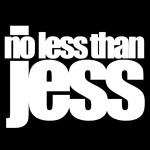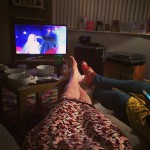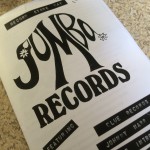“So, I’m in Wakefield. Where do you recommend I should go?” “Leeds.”
Back in September the Wakefield music ‘scene’ (such as it is) exploded a bit, triggered by a contentious blog article on Wakefield Music Collective written by Dean Freeman of Rhubarb Bomb. A week or two later Wakefield Express published an op-ed piece by the same author, bemoaning the fact that pub-goers preferred seeing a cover band to heading upstairs and seeing an ‘originals’ band. A more recent edition of the Express gave over a whole page to three well thought-out responses from a local musician, the part-owner of the sort of venue Dean was laying into, and a punter. This is not about that fight.
My first memory of a Wakefield gig was seeing Frank White down at the Post Haste (now the Snooty Fox) in the early 80s when I can’t have been more than 9 years old and I was a Wakefield Jazz regular until 1993ish. My experience of the more recent ‘scene’ has therefore been principally rooted in the years since Nicky and I moved back up North: roughly 10 years during which I’ve photographed a lot of bands (signed and unsigned), performed with a few, promoted some gigs, been balls-deep in organising festivals and danced at more gigs than I care to count. I’ve yet to come across any area which is like Wakefield. Why?
The Wakefield music scene is unique maybe because Wakefield music fans (and most of its musicians) like to think “big”: after all we’re deemed to be a city if only for the looming presence of Wakefield Cathedral. We’re a town really though – quite small in the grand scheme of things: there are a couple of venues but nothing you’d call sizable. Geographically we’re a satellite, little more than a dormitory of Leeds in terms of the inhabitants and just a few junctions down the M1. Heck, even the inhabitants (me included) refer to it as ‘town’. We don’t have a University from which students thirst for big acts, and although Westgate is frequently full of partygoers from outside town few of them seem to make it further than the nightclubs.
A common complaint from the musos is the absence of a decent-size venue to attract “big” acts: the closest we have to a ‘national-class’ venue is The Hop with an upstairs cap of about 200 people, competent sound guys and good management. Unless you count the club venues (of which Balne Lane WMC has been the usual venue for big acts such as The Fall or Glasvegas albeit more out of necessity) or Mustang Sally (which has been talked into hosting large gigs on occasion) then I suppose the next size up is Wakefield Theatre Royal. Black Flag Warehouse on Smyth Street showed promise but soon after opening it nosedived, cancelling gigs due to horrendous ticket sales and went spectacularly bust several times over. We might have Unity Hall in a couple of years and although I made a small investment to bootstrap it I’m not optimistic about the ability to sell tickets to keep it going while it builds up a reputation.
Why is this? Well, I think partially the bands. Wakefield’s “think big” attitude doesn’t help the acts themselves – it’s all too easy to just play gig after gig in the city on a support slot and convince yourself you’re brill. Those sorts of nights attract the ‘friends and family’ audience for sure, but if I had a penny for every time I’d been asked to go support a band who are playing at one venue tonight, a venue nearby little more than a week later, and another Wakefield City Centre venue in two weeks time I’d be a rich man; I’m not going to go to all those gigs and I certainly won’t shell out for the same set time after time. Last year’s Long Division Festival 2012 had some terrific acts on but I’ve heard from more than a few people the complaint that save for a couple of really good headliners it had been filled out with every single Wakefield band signed to one of our local record labels (I discovered the extent of this when I was involved in organising Clarence Park Music Festival and trying to find a local indie act which hadn’t played Long Division – it was extremely difficult).
If you’re looking for a success story then look no further than the group who had the good sense to get out of the city as quickly as they could instead of getting trapped in the whirlpool: The Cribs. Regardless of what you think of their music, you have to admit the following in Wakefield is one of near-religious fanaticism: a sighting of a Jarman brother at a gig or a festival quickly leads to rumours that there might be a secret gig in town. Other bands could easily get to this stage, but it’s a matter of getting out of the comfort zone of perpetual support slots at the local venues. Bands want their fans to come to them in Wakefield, maybe because it’s a bit more effort to get a gig elsewhere, or maybe they just don’t want to risk playing to empty rooms.
T’was ever thus though: if you read I’ll Go to T’foot of Our Stage: The Story of Yorkshire Pop Music written by Craig Ferguson, Wakefield is rarely mentioned save for Be Bop Deluxe. Players Club in the 90s played the same acts over and over again (I remember a poster for a band called The Mad Egyptians stating “bollocks, it’s just cos they’re sick of playing at Players”).
So what’s the answer? Well in my humble opinion it needs to start with the bands. Get the bands playing outside Wakefield, and the city becomes more known for its acts. As it becomes more known for its acts, people are more likely to travel in to see someone they’ve never heard of. Although we have a hell of a lot of talent in the area promoters need to stop putting on the same local acts all the time: there’s tons of bands in Leeds, Sheffield, Huddersfield, Manchester and all over the place who’d like a gig elsewhere. Hell, while I was doing stuff with Wakefield Music Collective our incoming mailbox was chock full of requests-to-play, so it’s definitely not that difficult. Apply a simple rule: if the act’s played locally within the last 3 months, don’t put them on unless you’re really desperate, or even better do an act-swap with another venue in another city.
That quote at the top by the way is a genuine response from an audience member at The Hop’s monthly Kill For A Seat comedy night. As tongue in cheek as it was, I fear they may have a point.
 Hey everyone, I’m in a girl band.
Hey everyone, I’m in a girl band.


 Yesterday was
Yesterday was 